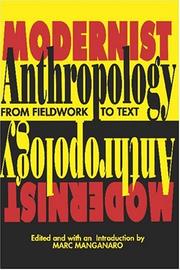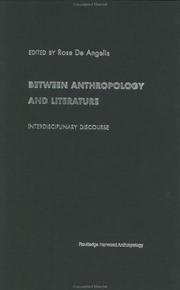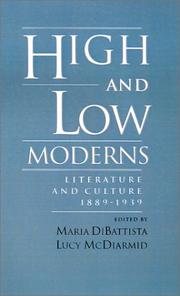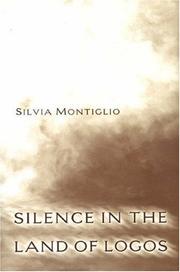| Listing 1 - 10 of 36 | << page >> |
Sort by
|
Book
ISBN: 3825374025 9783825374020 Year: 2013 Publisher: Heidelberg Universitätsverlag Winter
Abstract | Keywords | Export | Availability | Bookmark
 Loading...
Loading...Choose an application
- Reference Manager
- EndNote
- RefWorks (Direct export to RefWorks)
Hauptbeschreibung ''Phantasmatic Knowledge'' investigates changing anthropological visions as they were negotiated in late Victorian and early twentieth century literature. It starts from the assumption that in nineteenth century scientific discourse, a human being can only be accepted as fully human if it is visually perceived as human. One of the scientific genres to ''produce'' and normalize man in the late nineteenth century is the case study, so the first part of the book analyses three notorious ''cases'' of late Victorian London, Joseph Merrick, the so-called ""Elephant Man"", Jack the
Literature and anthropology. --- English literature --- History and criticism.
Book
ISBN: 1785330195 Year: 2016 Publisher: New York Berghahn Books
Abstract | Keywords | Export | Availability | Bookmark
 Loading...
Loading...Choose an application
- Reference Manager
- EndNote
- RefWorks (Direct export to RefWorks)
Writing is crucial to anthropology, but which genres are anthropologists expected to master in the 21st century? This book explores how anthropological writing shapes the intellectual content of the discipline and academic careers. First, chapters identify the different writing genres and contexts anthropologists actually engage with. Second, this book argues for the usefulness and necessity of taking seriously the idea of writing as a craft and of writing across and within genres in new ways. Although academic writing is an anthropologist's primary genre, they also write in many others, from drafting administrative texts and filing reports to composing ethnographically inspired journalism and fiction.
Ethnology --- Communication in ethnology. --- Literature and anthropology. --- Authorship.
Book
ISBN: 1498515223 0739175033 9780739175033 1299861539 9781299861534 9780739175026 0739175025 9781498515221 Year: 2013 Publisher: Lanham
Abstract | Keywords | Export | Availability | Bookmark
 Loading...
Loading...Choose an application
- Reference Manager
- EndNote
- RefWorks (Direct export to RefWorks)
This volume of essays reflects current theoretical, methodological, and pedagogical approaches to literary anthropology. The interdisciplinary perspectives on novels and travel writing from the past and present are relevant to the social sciences and humanities including anthropology, sociology, political economy, history, cultural studies, literary criticism, gender, and women's studies.
Literature and anthropology. --- Fiction --- Anthropology and literature --- Anthropology --- History and criticism.

ISBN: 069163355X 1400861411 0691604428 0691014809 9781400861415 9780691068466 0691068461 9780691014807 9780691604428 Year: 1990 Publisher: Princeton (N.J.): Princeton university press,
Abstract | Keywords | Export | Availability | Bookmark
 Loading...
Loading...Choose an application
- Reference Manager
- EndNote
- RefWorks (Direct export to RefWorks)
Recent insights into the nature of representation and power relations have signaled an important shift in perspective on anthropology: from a fieldwork-based "science" of culture to an interpretive activity bound to the discursive and ideological process called "text-making." This collection of essays reflects the ongoing cross-fertilization between literary criticism and anthropology. Focusing on texts written or influenced by anthropologists between 1900 and 1945, the work relates current perspectives on anthropology's discursive nature to the literary period known as "Modernism.".The essays, each demonstrating anthropology's profound influence on this important cultural movement, are organized according to discourse type: from the comparativist text of Frazer, to the ethnographies of Boas, Benedict, Mead, and Hurston, and on to the surrealist experiments of the College de Sociologie. Meanwhile the book's orientation shifts from essays that approach anthropology from the vantage points of literariness and textual power to those that contemplate what bearing the junction of cultural theory and anthropology can have upon present and future social institutions.In addition to the editor, contributors include Vincent Crapanzano, Deborah Gordon, Richard Handler, Arnold Krupat, Francesco Loriggio, Michele Richman, Marty Roth, Marilyn Strathern, Robert Sullivan, John B. Vickery, and Steven Webster.Originally published in 1990.The Princeton Legacy Library uses the latest print-on-demand technology to again make available previously out-of-print books from the distinguished backlist of Princeton University Press. These editions preserve the original texts of these important books while presenting them in durable paperback and hardcover editions. The goal of the Princeton Legacy Library is to vastly increase access to the rich scholarly heritage found in the thousands of books published by Princeton University Press since its founding in 1905.
Literature and anthropology. --- Anthropologists' writings. --- Anthropology --- Fieldwork. --- Methodology. --- Anthropologists' writings --- Literature and anthropology --- Anthropology and literature --- Anthropologists' literary writings --- Writings of anthropologists --- Literature --- Fieldwork --- Methodology --- SOCIAL SCIENCE / Anthropology / General. --- Anthropology - Fieldwork. --- Anthropology - Methodology.
Book
ISBN: 9781785337420 9781785330186 1785330187 1785330195 1785337424 Year: 2017 Publisher: New York : Berghahn Books,
Abstract | Keywords | Export | Availability | Bookmark
 Loading...
Loading...Choose an application
- Reference Manager
- EndNote
- RefWorks (Direct export to RefWorks)
Writing is crucial to anthropology, but which genres are anthropologists expected to master in the 21st century? This book explores how anthropological writing shapes the intellectual content of the discipline and academic careers. First, chapters identify the different writing genres and contexts anthropologists actually engage with. Second, this book argues for the usefulness and necessity of taking seriously the idea of writing as a craft and of writing across and within genres in new ways. Although academic writing is an anthropologist’s primary genre, they also write in many others, from drafting administrative texts and filing reports to composing ethnographically inspired journalism and fiction
Ethnology --- Communication in ethnology. --- Literature and anthropology. --- Authorship. --- #SBIB:39A2 --- #SBIB:309H519 --- Anthropology and literature --- Antropologie: methoden en technieken --- Praktische handleidingen i.v.m. schrijven en spreken --- Anthropology --- Communication in ethnology --- Literature and anthropology --- Authorship

ISBN: 0415287146 0203294653 0415753902 0203218051 1280180358 1134446152 9780203218051 9780415287142 6610180350 9786610180356 9780415753906 9781134446155 9781280180354 1134446144 9781134446148 Year: 2002 Publisher: London ; New York, NY : Routledge,
Abstract | Keywords | Export | Availability | Bookmark
 Loading...
Loading...Choose an application
- Reference Manager
- EndNote
- RefWorks (Direct export to RefWorks)
This collection suggests that the disciplines of literature and anthropology are not static entities but instead fluid sites of shifting cultural currents and academic interests. The essays conclude that the origins, sources, and intersections of the two disciplines are constantly being revised, and reconceived, leading to new possibilities of understanding texts.The authors address the ways in which the language of social science fuses with that of the literary imagination. The essays fit excellently with the current interest in interdisciplinary studies and challenge students to see text
Literature and anthropology. --- Literature, Modern --- Anthropology and literature --- Anthropology --- History and criticism. --- ANTHROPOLOGIE ET LITTERATURE --- LITTERATURE MODERNE --- HISTOIRE ET CRITIQUE

ISBN: 128044343X 1423758552 0195359542 1601299249 9781423758556 9781280443435 9786610443437 6610443432 0195082664 9780195082661 0197724450 Year: 1996 Publisher: New York Oxford University Press
Abstract | Keywords | Export | Availability | Bookmark
 Loading...
Loading...Choose an application
- Reference Manager
- EndNote
- RefWorks (Direct export to RefWorks)
High modernists such as Yeats, Joyce, Eliot and Woolf are customarily treated as if they wrote in different worlds and eras from the low modernists such as Hardy, Shaw and Wells. This collection brings these writers into critical proximity.
English literature --- Modernism (Literature) --- Popular literature --- Literature and anthropology --- Popular culture --- Anthropology and literature --- Anthropology --- History and criticism. --- History.

ISBN: 1282767143 9786612767142 1400823765 1400812747 9781400812745 9781400823765 9780691004723 0691004722 9780691146584 0691146586 140080552X 1400805538 Year: 2010 Publisher: Princeton ; Oxford Princeton University Press
Abstract | Keywords | Export | Availability | Bookmark
 Loading...
Loading...Choose an application
- Reference Manager
- EndNote
- RefWorks (Direct export to RefWorks)
In ancient Greece, the spoken word connoted power, whether in the free speech accorded to citizens or in the voice of the poet, whose song was thought to know no earthly bounds. But how did silence fit into the mental framework of a society that valued speech so highly? Here Silvia Montiglio provides the first comprehensive investigation into silence as a distinctive and meaningful phenomenon in archaic and classical Greece. Arguing that the notion of silence is not a universal given but is rather situated in a complex network of associations and values, Montiglio seeks to establish general principles for understanding silence through analyses of cultural practices, including religion, literature, and law. Unlike the silence of a Christian before an ineffable God, which signifies the uselessness of words, silence in Greek religion paradoxically expresses the power of logos--for example, during prayer and sacrifice, it serves as a shield against words that could offend the gods. Montiglio goes on to explore silence in the world of the epic hero, where words are equated with action and their absence signals paralysis or tension in power relationships. Her other examples include oratory, a practice in which citizens must balance their words with silence in very complex ways in order to show that they do not abuse their right to speak. Inquiries into lyric poetry, drama, medical writings, and historiography round out this unprecedented study, revealing silence as a force in its own right.
Book
ISBN: 0813938805 9780813938806 9780813938783 0813938783 9780813938790 0813938791 Year: 2016 Publisher: Charlottesville
Abstract | Keywords | Export | Availability | Bookmark
 Loading...
Loading...Choose an application
- Reference Manager
- EndNote
- RefWorks (Direct export to RefWorks)
Reviewing their essays, scientific publications, dictionaries, novels, poetry, and visual arts, the author traces the cultural study of Latin America back to these interdisciplinary discussions about the meaning of race and culture in Latin America, discussions that continue to provoke us today.
Book
ISBN: 9780823280797 0823280799 9780823228867 082322886X 9780823228874 0823228878 Year: 2008 Publisher: New York, NY : Fordham University Press,
Abstract | Keywords | Export | Availability | Bookmark
 Loading...
Loading...Choose an application
- Reference Manager
- EndNote
- RefWorks (Direct export to RefWorks)
Panourgia and Marcus bring together anthropologists working in various parts of the world (Greece, Bali, Taiwan, the United States) with classicists, historians, and scholars in cultural studies. The volume takes into account global realities such as 9/11 and the opening of the Cypriot Green Line and explores the different ways in which Geertz's anthropology has shaped the pedagogy of their disciplines and enabled discussions among them. Focusing on place and time, locations and temporalities, the essays in this volume interrogate the fixity of interpretation and open new spaces of inquiry. The volume addresses a wide audience from the humanities and the social sciences--anyone interested in the development of a new humanism that will relocate the human as a subject of social action.
Literature and anthropology. --- Art and anthropology. --- Anthropology --- Political aspects. --- Philosophy. --- Human beings --- Anthropology and art --- Anthropology and literature --- Primitive societies --- Art and anthropology --- Literature and anthropology --- #SBIB:39A3 --- Philosophy --- Political aspects --- Antropologie: geschiedenis, theorie, wetenschap (incl. grondleggers van de antropologie als wetenschap) --- Social sciences
| Listing 1 - 10 of 36 | << page >> |
Sort by
|

 Search
Search Feedback
Feedback About UniCat
About UniCat  Help
Help News
News